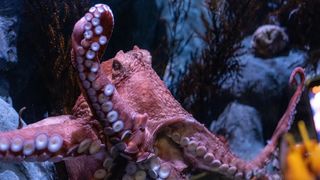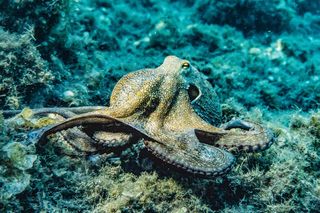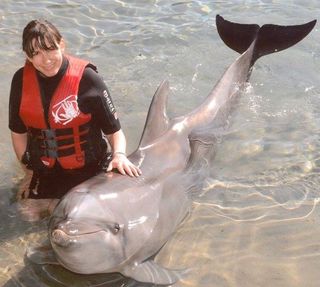Health
What Is Good for an Octopus?
Heather Browning asks us to consider the octopus' point of view.
Posted March 7, 2020 Reviewed by Kaja Perina

Heather Browning, an Australian zookeeper at the National Zoo & Aquarium Canberra and PhD candidate at the Australian National University, working on the methodological and conceptual problems arising in the measurement of subjective animal welfare has recently published a brief article with the titular question: "What is good for an Octopus?"
There is now a wealth of research on Octopus behaviour that suggests that cephalopods (octopuses, squid, and cuttlefish) are sentient creatures with complex mental lives. The Cambridge Declaration on Consciousness states: “the weight of evidence indicates that humans are not unique in possessing the neurological substrates that generate consciousness. Non-human animals, including all mammals and birds, and many other creatures, including octopuses, also possess these neurological substrates.” What does the mental life of an Octopus look like? Browning argues that:
"[t]his is of primary interest when considering the welfare of octopuses. If octopuses are sentient, then they have a welfare that can be harmed or benefitted." - Heather Browning

As octopus farming is currently only growing we should start to immediately implement policies that ensure the wellbeing and quality of life of the affected cephalopods involved in farming.
As our understanding of octopus minds is currently poor, after all, their minds evolved separately from ours in the evolutionary tree, there is an urgency to conduct research into these wondrous creatures and learn about the conditions that make their lives more pleasant and cause them displeasures. Importantly, we need to consider their minds as having evolved in vastly different environments from ours. As Browning argues:
"Lights which appear gentle to the human eye may not be so within the octopus perceptual range, so light polarisation should also be measured and taken into account. Chemicals within the tank can affect health but may also be pleasant or aversive in ways we may not usually consider. Chemosensory enrichment opportunities could open up new avenues of exploration. Vibrations through the water can have a large impact on octopus health and welfare" - Heather Browning
From their experience of light to smell and vibrations through the water, their sensory experience is a very different one. It is likely that we'll gain a better understanding of 'what an octopus desires' and 'what improves their lives' with further scientific research on their behaviour. Similar to human children, octopuses have an inherent drive toward exploration. They are curious and seem to enjoy stimulation with novel environments. It is therefore important to offer farm octopuses changes in their environment.
Furthermore, and here they are very much unlike humans: octopuses lack any protective shell. As soft and squishy as they are they present an ideal target of predation. This is why octopuses are often seen camouflaging near potential hideouts. Without any such environmental affordances, it is likely that octopuses experience a form of stress and fear. If we are interested in their wellbeing we should not be reluctant to offer them 'safe-spaces'.
In conclusion:
"The mind of an octopus may be highly different from our own, but it is only by trying to see the world from their point of view that we will be able to find out what is good for them and hence ensure their welfare." - Heather Browning

If you are interested in animal welfare more generally - you might be interested in checking out Heather Browning's work more generally:
https://www.heatherbrowning.net
Follow the author on facebook and twitter to receive the latest updates!


